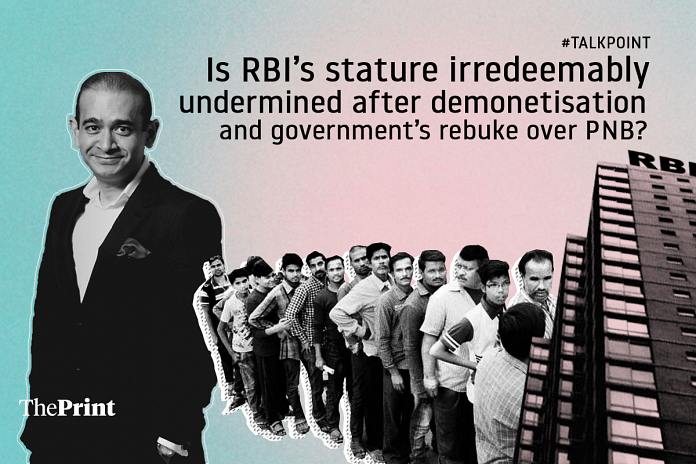In a stern rebuke over the PNB scam, Finance Ministry has questioned RBI’s “efficacy of supervision to detect and check systemic failure,” and called its framework to prevent frauds “inadequate”.
The RBI responded that it had warned banks about the misuse of technology (SWIFT) in 2016.
ThePrint asks: Is RBI’s stature irredeemably undermined after demonetisation and government’s rebuke over PNB?
There needs to be a fundamental rethink of the role and functioning of RBI.
 Radhika Pandey
Radhika Pandey
Consultant, National Institute of Public Finance and Policy
The question of who initiated the demonetisation exercise is an unsettled one. However, the recent turn of events does point to the need for a fundamental rethink of the role and functioning of the RBI.
Until the RBI Amendment Act of 2016, the Preamble of the Act described it as a ‘temporary provision’. The RBI Amendment Act of 2016 gave an objective to the central bank. While RBI has formally adopted an inflation targeting framework, it still has a multitude of roles to perform, which sometimes are inherently contradictory in nature. The RBI is the debt manager, banking sector regulator, manager of the exchange rate, in addition to being an inflation targeting central bank. The multitude of rules gives a potential for averting accountability for each role.
The problems with banking sector regulation have been a subject of great debate. Many expert committees have given their views on addressing the weaknesses in banking regulation. The crux of the proposals is to move towards ownership neutrality in banking regulation i.e. a harmonised regulatory treatment for all banks irrespective of the nature of ownership of banks. This is currently lacking. The legal framework of public sector banks accords a somewhat diluted power to the RBI in the field of appointments of key officials, governance and resolution. Until these fundamental issues are acknowledged and addressed, a rebuke by the government will not serve any purpose.
Having said that, the RBI needs to do better in its supervisory role. Such problems could be simmering in private sector banks as well. A check on the fraudulent practices arising from the malicious use of SWIFT transactions is at the core of RBI’s supervision.
The RBI has clearly failed in its supervision of the banking system
 Narendar Pani
Narendar Pani
Professor at the National Institute of Advanced Studies.
The view that the stature of the RBI has been irredeemably undermined by recent events may be an overstatement. The RBI is a robust institution that has in the past stood up to the finance ministry and ably managed the rupee in times of global turmoil.
Yet, there is no doubt that the credibility of this institution has taken a severe battering over the last few years. Its actions on demonetisation damaged the very faith in the rupee. From being an acceptable currency in neighbouring countries like Bhutan and Nepal, the rupee now needs repeated RBI messages on mobile phones to assure people that the new ten rupee coin is legal tender.
The RBI’s choice of the denominations of currency to replace the withdrawn notes in demonetisation also hurt its credibility as a repository of knowledge about money. As any student of economics knows, a Rs 500 note that is circulated four times generates money supply of Rs 2000, while a Rs 2000 note that does not find takers plays no role in the money supply. Yet, the RBI tried at first to replace the rapidly circulating Rs 500 note with new Rs 2000 notes, which had few takers. The choice of denomination added its bit to the delay in effectively replacing the demonetised currency.
It is against this backdrop of a badly managed demonetisation that the Nirav Modi crisis in Punjab National Bank comes as an added blow to the RBI’s credibility.
The institution has clearly failed in its supervision of the banking system. Given a public mood that is virulently against scams, a mood that the present government ironically did a lot to create, the costs of this failure for the RBI would be very high. The institution and its leadership need not just ensure that there are no other errors in supervision lurking around the corner, but also initiate measures to demonstrate that it is up to the job.
Not just the old heads, the current RBI governor hasn’t exactly contributed to increasing its credibility
 Rajeev Chandrasekhar
Rajeev Chandrasekhar
NDA MP
The Indian economy is heavily dependent on credit from our banking system which constitutes over 80 per cent of its capital.
Fun Fact: Government-owned public sector banks of which worthies like the SBI and PNB are the majors- account for almost 73 per cent of credit into our economy.
Another fun fact: The Reserve Bank of India is the banking sector regulator, the institution that is supposed to oversee the health and integrity of the banks. It has been, over the years, an institution that has remained credible, especially under the leadership of people like Dr Y.V. Reddy.
Now imagine this: This lifeline of our economy– the public sector banks- is brought to its knees because the big borrowers stop repaying them, a phenomenon referred to as Non-Performing Assets (NPAs). Or, in the case of Nirav Modi, either through a decade of crony lending or banking fraud, or both. Imagine the impact of this shattered banking system on our economy, investments and job creation.
In July 2012, I was the first MP to raise the issue of fast-growing NPAs in our banks –what I thought then was an alarming Rs 69,000 crore– nothing compared to the over 6 lakh crore it is today. Nothing really was done by the UPA and the problem mushroomed and predictably the problem fell into the lap of the current government.
In all the discussions around the much-exploited or moribund (you can choose the word you prefer) banks, the second ‘fun fact’ has been ignored. The role of the RBI is central to the health of the banks and credit markets in India. It is the supervisor and what was it doing during the early days of the NPAs problem? And what has been its role when even the second largest public sector bank PNB is felled by a banking fraud that exposes weak or non-existent risk management systems?
Worthies like Subba Rao (a former finance secretary) and Raghuram Rajan were at the helm of the RBI when these systemic problems ballooned. Amidst all their eloquence and rich economic prose and poetry, they seem to have ignored their basic job: banking supervision and accountability for the same.
I have raised on more than one occasion, including in debates in parliament, the need to hold the RBI fully accountable for banking sector failures. I think this trend amongst the parliament and media to cheerlead and create superstars, without the scrutiny of their performance, is particularly galling in case of Raghuram Rajan who did precisely nothing about the failing bank issue till it had spiralled out of control. And when he did, it was in a kneejerk manner, correcting so hard that it shut off any remaining credit to the economy. I wasn’t very popular when I called for accountability of Raghuram Rajan and Subba Rao as regulators – but as things have now shown, I was right in doing so.
The current RBI governor hasn’t exactly contributed to increasing the regulator’s credibility either. This failure of PNB has happened on his watch. The RBI’s reputation and credibility shape global perception and ratings of our financial sector and economy. While the UPA government undoubtedly is the star in this tragic saga, the role of the RBI and its diminishing stature as a consequence of their failure as bank regulator creates cause for worry.
The silver lining in the PNB scam is it may trigger some churn in RBI and tighten the screws on banks
 Sandip Ghose
Sandip Ghose
Marketing executive and commentator
We learnt from our school economics textbooks, that the Reserve Bank of India is the ‘lender of last resort’. In layman parlance, the buck stops at the RBI. This back-to-basics definition underscores the custodianship and regulatory role of the central bank. This perhaps got the short shrift in the pursuit of more glamorous aspects of the RBI governor’s job that a ‘Page 3’ intellectual had famously described as ‘putting sex back into Sensex’.
Historically, RBI governors have generally been career bankers, bureaucrats or technocrats. While balancing the ‘Holy Trinity’ of price stability, financial stability and sovereign debt sustainability, to use Duvvuri Subbarao’s coinage, they brought in a wealth of administrative experience.
‘Rockstar’ Raghuram Rajan was, perhaps, the first pure academic to hold the high office in Mumbai’s Mint Street. Unlike him, his predecessor did not feel the compulsion to compete with Alan Greenspan among the haloed circles of World Bank and the IMF alumni in Washington DC. As many commentators have noted, these veteran and seasoned professionals were able to maintain a healthy offline relationship with the PMO and South Block without surrendering their professional independence. Their standing and credibility in the bureaucratic circles enabled them to assert the RBI’s authority and mandate without fear or, one assumes, favour.
On demonetisation, the bulk of the critique has been on RBI’s alleged co-option into what was patently a political rather than an economic or policy action. But, not enough has been said about the RBI’s failure in managing the currency replacement exercise on the ground. This revealed a serious weakening in the Reserve Bank’s traditional delivery capabilities.
The Nirav Modis, Mehul Choksis, Vikram Kotharis and, who knows how many more diamonds are waiting to tumble out of the closet, are all symptomatic of the same malady. The silver lining is that this may trigger some churn with the RBI tightening the screws and banks trying to clean up their act with audits and investigations.
It is time for the bankers to go back to knitting after eating some humble vada-pav next to the PNB branch on Brady Street, shunning the cameras and canapes of the cocktail circuit.
This is a clear case of operational misfeasence gone completely undetected by audit firms.
 Abhishek Krishnan
Abhishek Krishnan
Business analyst, ThePrint
While demonetisation undoubtedly took the RBI by surprise, it would be incredibly presumptuous to assume that it was a silent spectator in this preposterous operational and risk management failure of the PNB. These instances do not constitutionally undermine the stature of the RBI as much as they create a false sense of complicity, which is an extremely simplistic and unnecessary diagnosis.
As clearly pointed out by the finance minister, it is the job of an internal/external auditor to detect and bring to the public’s notice any accounting irregularity in the financial records of a company. The Rs 11,500 crore scam is a consequence of collusion between a few junior level employees and the customer, facilitated by the abuse of a technological system (SWIFT) that is largely disconnected from the accounting systems of a bank, hence enabling the execution of unrecorded transactions. This is a clear case of operational misfeasence gone completely undetected by audit firms.
As per the functions and workings of the RBI on the other hand, its supervisory functions under fraud detection involve sensitising banks about common fraud-prone areas and their modus operandi. In this regard, it is primarily supposed to act as a cautionary intermediary that mandates good practices to mitigate fraud. It seems to me then that the RBI is well on the side of assiduity, having advised banks thrice in 2016 against the threat of technological risk.
That being said, there is definitely a need for the RBI to prescribe more stringent directives to plug these gaps in the banking system that leave room for collusion between credit operation and credit risk assessment teams.
Compiled by Deeksha Bhardwaj, Journalist at ThePrint.




Rajeev chandrasekhar analysis is self congratulatory.In running down Raghuram Rajan he is just pleasing his friends in the BJP.It is a motivated reaction to find fault with particular persons and could have been spoken by any party Appartchik
The comments of Mr Chandrashekar were predictable. They could as well have been used as the press release of his party sans the blowing of his trumpet bit. Blame the previous Government and RBI Governor and become blind when it comes to his own Government. The average reader learns nothing reading his view on this issue.